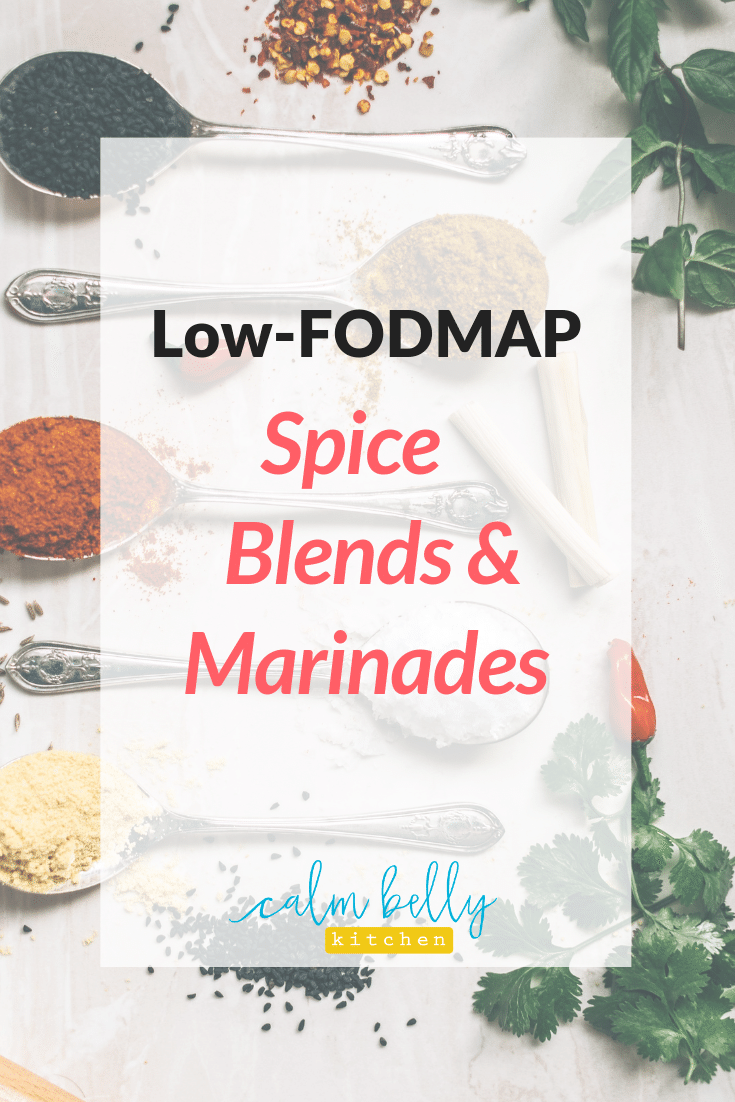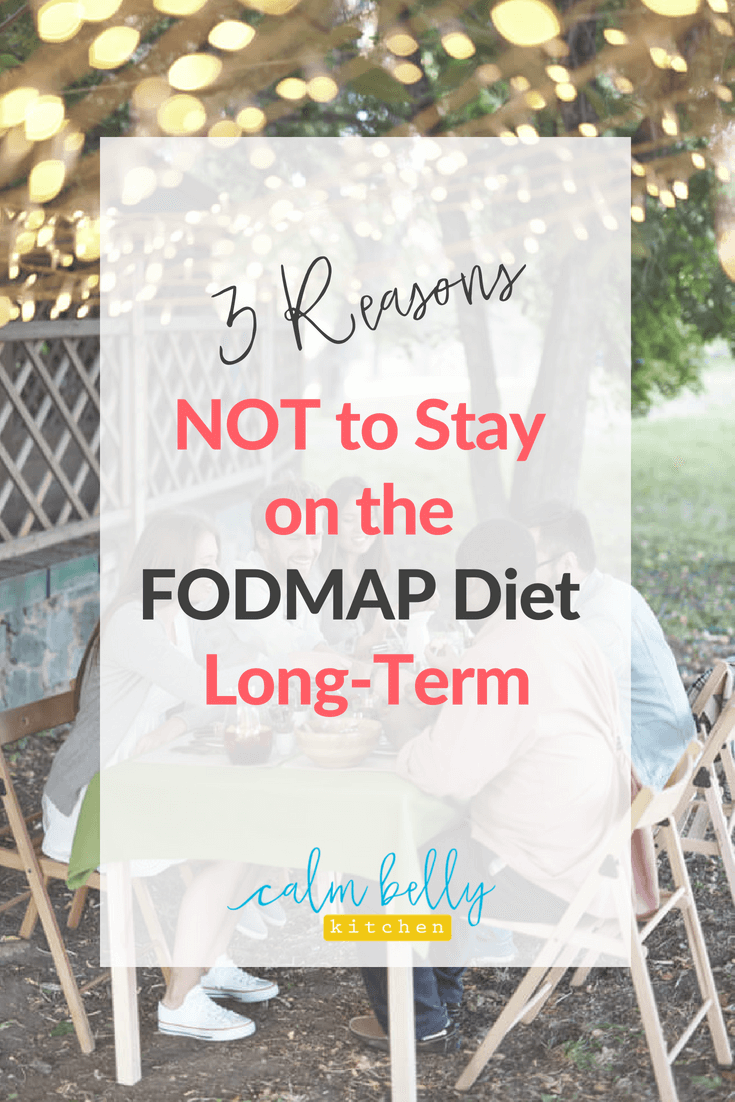Save it on Pinterest!
Dealing with occasional constipation is very low on the list of fun and enjoyable things. Dealing with chronic constipation (infrequent bowel movements over an extended period of time) is even more aggravating.
The abdominal pain, the discomfort, the cramping, pinching, and feeling of being unable to let it all go… it’s pretty awful, and it impacts your daily life in countless ways.
If you’ve been struggling with chronic constipation, and nothing you’ve tried so far has helped, you might have IBS-C. And if that’s what’s going on, there’s good news: The FODMAP diet can help you with this stubborn symptom.
Unlike the occasional bout of constipation, IBS-C is caused by specific types of carbohydrates called FODMAPs. FODMAPs are found in a wide array of foods.
While these foods are perfectly healthy for most people, they can trigger symptoms if you have IBS. (And if you aren’t sure whether your constipation is caused by IBS or not, keep reading.)
Foods That Cause Constipation
For people with IBS-C, constipation is caused by the fermentation of high-FODMAP foods as they sit in the large intestine. These foods can’t be digested properly by people with IBS, and the byproduct of that fermentation is gas, among other things. This, in turn, causes the bloating, pain, and digestive slow-down. No fun.
Here are some of the most common constipation-causing high-FODMAP foods:
Apples
Pears
Peaches
Cherries
Blackberries
Watermelon
Plums
Dried fruit
Asparagus
Cauliflower
Peas
Onions
Garlic
Milk, yogurt & ice cream
Wheat bread and pasta
Rye bread
Beans
Cashews & pistachios
Coconut flour
For a free cheat sheet listing high-FODMAP foods, click here.
Some people with IBS are prone to constipation, while others are prone to diarrhea, in what’s called IBS-D. And some folks with IBS experience both constipation and diarrhea, at different times. It’s not entirely sure why this happens. Research is still being done!
FODMAPs are the major constipation culprit if you have IBS, but other foods can also play a role if eaten in large quantities or very frequently.
Other constipation-causing foods:
High Fat Meals - If you’ve spent a weekend eating fried food or lots of desserts and chocolate, you might end up constipated since fatty meals are slower to digest.
Red Meat - It can be higher in fat than other proteins, but its high iron content can stop you up as well. But don’t give red meat completely--just reduce the frequency so you can still get the health benefits.
Starchy, Low-Fiber Foods - Unripe bananas, white bread, and white rice can move through the digestive tract slowly. Opt for whole wheat bread and brown rice instead.
Alcohol - It irritates the stomach and dehydrates you, leading to slow-moving bowels. Drink in moderation and get plenty of fluids.
Natural Ways to Relieve Constipation
Constipation is a stubborn condition so often multiple strategies are needed. So, where do you start?
More Fiber? Yes, But...
A commonly-held belief with constipation is that it’s caused by a lack of fiber. Because of this, people often assume they need to add fiber to their diet, in the form of things like whole wheat breads and pastas, beans, fibrous veggies, and so forth.
But with constipation caused by IBS-C, this actually ends up loading the system with more high-FODMAP foods, causing even more problems. Tried adding more fiber to your diet, and it hasn’t helped? You might be dealing with IBS. Increasing your FODMAP intake is going to increase the problems.
Soluble vs. Insoluble Fiber
Even on a low-FODMAP diet plan, getting enough fiber is important, but you have to do it safely, in line with your plan. Foods like potatoes, brown rice, quinoa, nuts, chia seeds, spinach, other greens, carrots, strawberries can be great sources of safe fiber. You can aim for 20–25 grams per day, and adjust based on how you feel.
You can also take a fiber supplement, but if you have IBS, it’s important to only add the right kind of fiber to your diet.
Soluble fiber attracts water, which helps with the formation of normal stools--not too loose or too hard. Insoluble fiber, on the other hand, keeps things moving through your digestive tract.
Both soluble and insoluble fiber are good to add for IBS-C. For IBS-D, you should avoid the insoluble type.
Soluble fiber is great because it’s gentle and works for both IBS-C and IBS-D, regulating the bowels regardless of what extreme you’re dealing with.
One brand of soluble fiber I like and recommend is Heather’s Tummy Fiber. It’s been made specifically for IBS sufferers, and many of my clients love it. If you don’t have IBS, other fiber supplements made for constipation are a good option, too.
Of course, there are often other reasons why people experience occasional or chronic constipation. Those can be things like food allergies and intolerances, side effects of medication, unbalanced diet, other dietary or GI conditions, surgeries, or even hydration.
With any kind of constipation, it can be challenging to treat, and often done by trial and error. But if you have IBS, or suspect that it’s the source of your symptoms, then the FODMAP diet should be your first stop, because of how effective it can be at identifying those specific trigger foods.
The FODMAP Diet for Constipation
People hear the word ‘diet’ and think, ‘I’m going to be stuck eating three boring foods for the rest of my life! Maybe the symptoms are worth it, to keep enjoying the foods I love.’ I’m here to tell you that this isn’t the case!
The FODMAP diet is an action plan to help you identify which specific trigger foods are worsening your symptoms, so you can avoid them. It’s a three-step plan that begins with a short period of eating a very low-FODMAP diet, for only four to six weeks.
If removing FODMAPS helps you feel better, then you know you are on the right track.
Next, foods are slowly reintroduced, and your symptoms are monitored. As soon as a culprit is identified, you know what it is that’s messing you up! After reintroduction and analysis, you can go on with eating a wide array of healthy foods in sensible portions, and avoiding the foods that cause you discomfort.
I have a ton more information about getting started on the FODMAP diet! You can check it out here.
What about some other, at-home things you can do?
Essential Oils for Constipation
The use of essential oils can work wonders for constipation. Ginger, Peppermint, Fennel, Lavender, and Chamomile are some of the top choices.
You can add them to a diffuser throughout the day, add them to a nice warm bath, or gently massage your stomach with them, after they’ve been diluted in a safe carrier oil. (Never apply essential oils directly to your skin!)
Osmotic Laxatives
Osmotic laxatives such as MiraLAX are a great choice for constipation because they don’t cause harsh side effects like traditional laxatives do.
They work by drawing water into the colon and softening the hard stool there, making it much easier to pass. They can be a good choice for constipation, even as a result of IBS-C, but should also be paired with dietary changes overall, to prevent the stools from getting too hard.
Another option is Magnesium, which also draws water into the colon and intestines to soften the stools. Like MiraLAX, this softening allows the muscles of the digestive system to flex and move more naturally, passing the softened stool without pain or constriction.
Magnesium can be added to your diet by increasing your intake of magnesium-rich foods, such as spinach, peanuts, oatmeal, potatoes, rice, and salmon. Or, you can take a Magnesium supplement; I prefer Magnesium Citrate, because of your body’s ability to absorb it easily, but other forms can work too.
The Recommended Daily Allowance of magnesium—including food intake—is 420 mg for men and 320 mg for women.
Osmotic laxatives (or any laxative) should be reserved for occasional use, rather than an everyday go-to. Use them when symptoms are particularly bad, or you aren’t able to stick to your normal diet (think travel, illness, or times of high stress).
Conclusion
Constipation is frustrating, but you can make a difference with your symptoms through a few simple changes. Avoiding foods that cause constipation in the first place is key. The next step is trying additional remedies until you find the right mix that works for YOUR body.
If you aren’t sure whether your chronic constipation is caused by IBS or something else, a gastroenterologist should be your first stop to uncover the source of your symptoms.
If you want to know more, or if your head is spinning from a recent IBS diagnosis, then check out our ebooks. You’ll learn how to get started with the FODMAP Diet as quickly (and painlessly!) as possible.
This post contains affiliate links.










